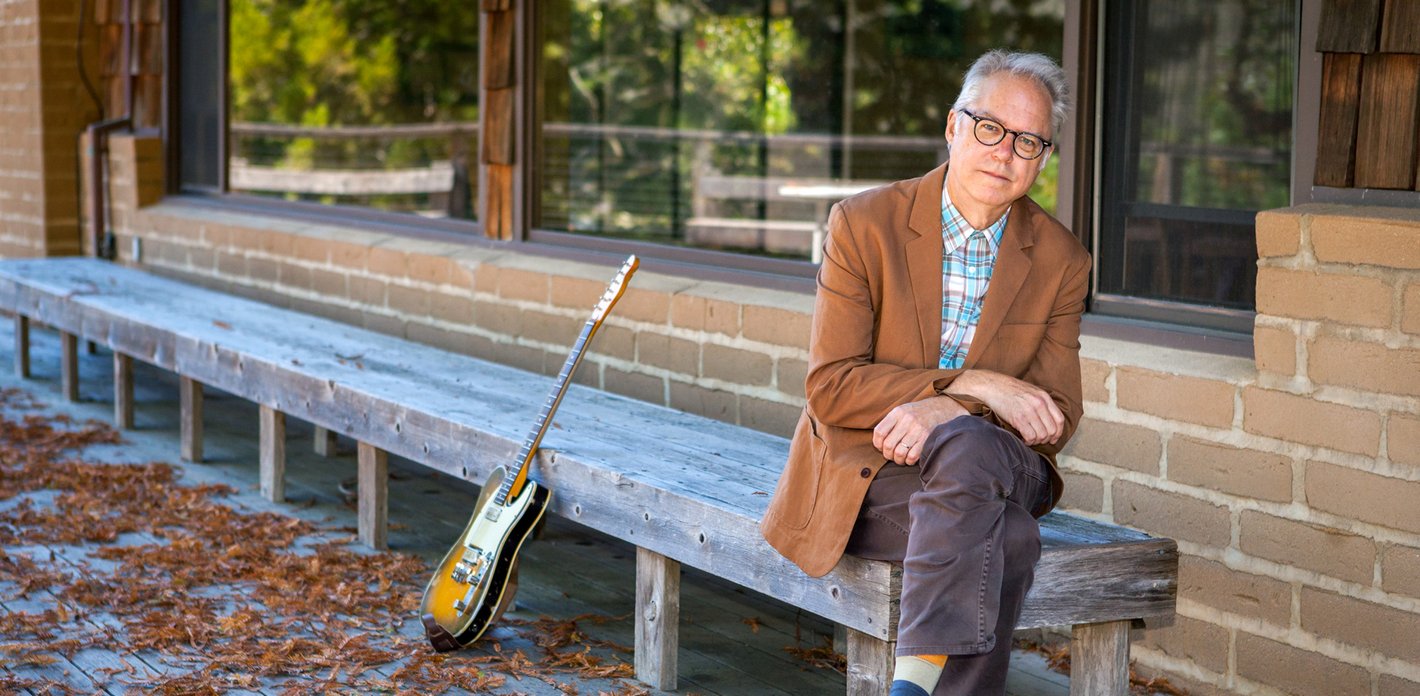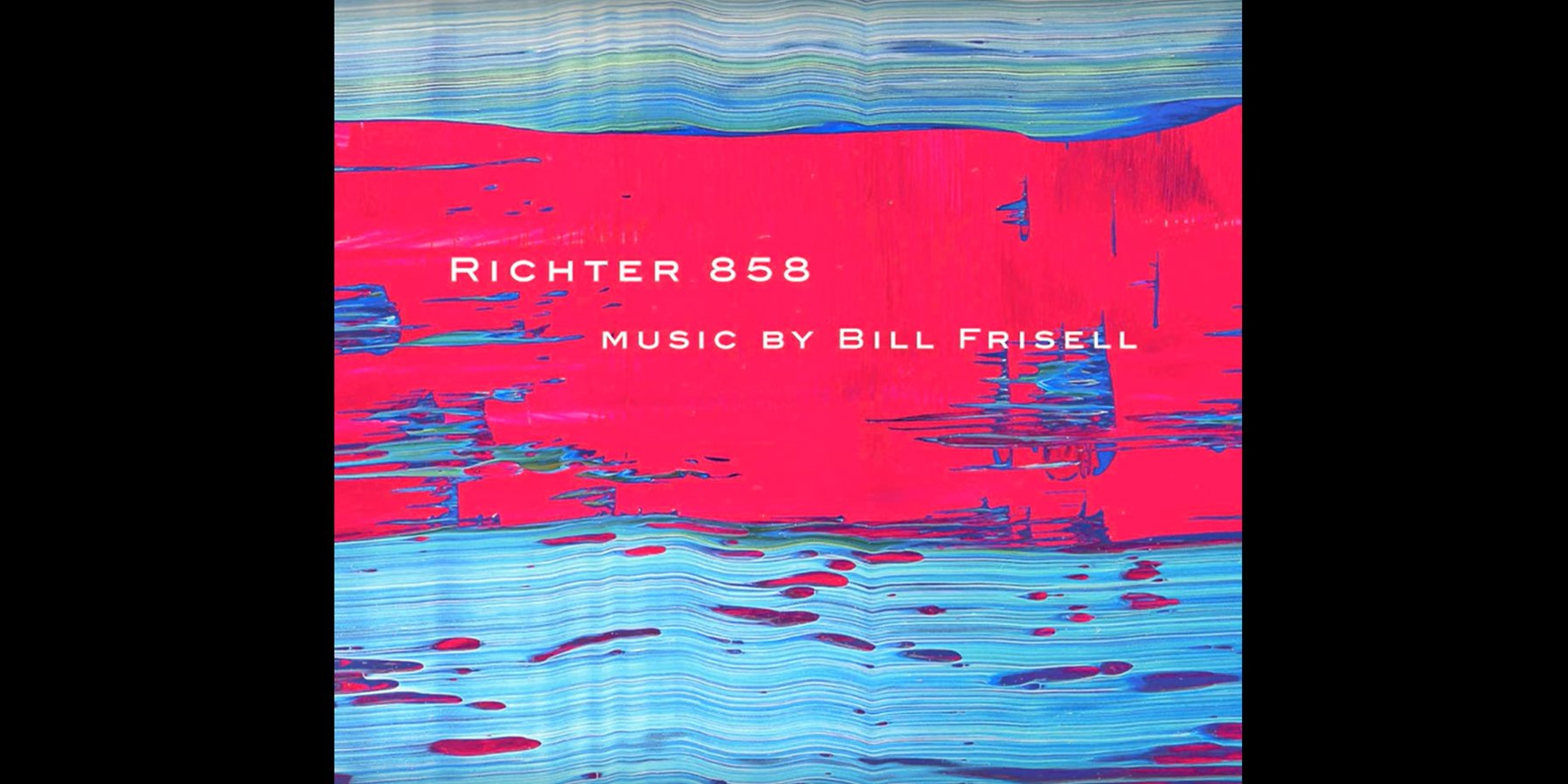Text: Ivana Rajič, 16.10.2023.
»If I don’t play, my sanity is at risk,« Bill Frisell admitted in an interview in September 2023. That’s why the American jazz guitarist, one of the most versatile of the last 40 years, is only back home – in Brooklyn, New York City – for one day. On the following morning, he will already be setting off for Mexico City, where he’ll be briefly sharing his delicate guitar sounds before moving on to the next stop. Despite this full diary, the 72-year-old musician looks very much at ease and deeply relaxed – just like his music. The quiet notes seem to come from nothing, slowly and finely knotted, unfolding as if in a non-speed. His answers come much faster. He seems approachable and emphasises: »We can talk about anything you like.«

Via guilty pleasures to arrive at his own sound
The answer to the question of how he found his unmistakable, one-in-a-million sound comes without hesitation: »It has something to do with not being afraid of showing who you are,« says Frisell. When, after graduating high school, his guitar teacher Dale Bruning introduced him to the music of Charlie Parker, Thelonious Monk, Sonny Rollins, Wes Montgomery and Jim Hall, Frisell wanted to clear all his previous musical influences from his head. In 1971, he took classes with his great inspiration at one of the leading educational institutions for contemporary jazz, the Berklee College of Music in Boston, Massachusetts. Four years later he would be studying there: »It was all about Jim Hall. I even had the same guitar as him. I acted as if it was still 1956. I was stuck in the past and wanted to be a bebop guy.«
However, with time, it became clear to Frisell that all the jazz musicians he looked up to developed their own language from the totality of their musical experiences. »I suddenly realised that I wasn’t being honest with myself. I had been more worried about what others would think. Everything I did had to be cool and modern. There was music that I secretly liked but that I was ashamed of.«
It’s hard to believe it today but these guilty pleasures included The Beatles and Burt Bacharach, the composer of songs such as »Raindrops Keep Fallin’ On My Head« and »I Say a Little Prayer« – which Frisell considered anything but cool back then. Decades later, he would finally pay tribute to these musical roots with his cover albums »The Sweetest Punch« (1999) and »All We Are Saying« (2011). Also influential for the young American musician were Bob Dylan’s folk-rock soundtracks to 1960s counterculture, which he heard in Denver in 1966. And two years later he experienced the revolutionary playing of Jimi Hendrix – the guitar genius of that rock era.
Born in the USA: the 1950s
Elvis Presley, Sam Cooke, Chuck Berry, Fats Domino and Buddy Holly got the rock ’n’ roll era underway in the 1950s, perfectly expressing the attitudes of an entire generation: non-conformity in a society in which everyone behaved the same and were obsessed with consumption and growth.
After the Second World War, the USA experienced an extraordinary boom, with low inflation and a spike in productivity. New cars, houses in the suburbs, and a television beaming family-friendly entertainment into almost every living room. »America at this moment,« said the former British Prime Minister Winston Churchill in 1945, »stands at the summit of the world«. However, the 1950s was also a decade of great conflict: the start of the Cold War and of the Civil Rights Movement highlighted divisions in American society.
»I was always shy. Music was a way for me to be with others.«
Although he was born in Baltimore in 1951, Frisell was raised right in the middle of it all, in Denver, Colorado, which is also said to be the home of the cheeseburger. »When I was growing up in the 1950s and 60s,« the guitarist recalls, »there was a certain segregation in this city based on skin colour, as well as an economic division. But where I went to school, everyone was together. And I didn’t realise until much later how lucky I’d been.« Community is something Frisell searches for through his music. »I was always shy. So music was a way for me to be with others. For me, it was all about this kind of communication – about simply listening and finding harmony with people.«
Music is his voice
Frisell initially had instrumental dialogues with the clarinet, and he joined the Denver Youth Musicians at the age of nine. But a few years later he became fascinated by the guitar. »When I was given my first guitar, a friend of mine also got one. And another friend got a drum kit. Within a few days, we’d learned a few songs and played them at a party. Right from the beginning it was all about playing with others.« So too with the members of the band Earth, Wind & Fire, with whom Frisell went to school, and who would later gain fame with hits such as »September« and »Shining Star«. »I remember a jam session in my cellar where Philip Bailey was drumming and I was playing the guitar.«
The Denverite may have swapped his wind instrument for a string one, but he never forgot about the breath. A phrase on the clarinet lasts just as long as the flow of air: it expresses the musical message, holds the sound and builds it. Just like when you sing. Frisell can also extend notes on the guitar, and get them to crescendo after plucking the string, rather than fade away – using a fuzz and volume pedal. Back in the 1980s he elevated this playing technique to a stylistic device and used all the available electronic distortion tools – loop machines, compressors and effect pedals – just as explosively as Gerhard Richter applies artistic tools to produce his stylistic incongruities. A series of abstract paintings by the German artist inspired Frisell to produce his 2005 album »Richter 858«.
The pull of New York
It was in the period after graduating in 1978 that Frisell ended up joining the colourful eccentrics of the East Village and the avant-garde scene of the Knitting Factory in New York City, the global capital of jazz. »I’ve always felt a pull to New York. Yet I was afraid of going there,« reveals the guitarist. »But I knew that the city was an important part of music history, and I was determined to experience that.«
Frisell initially found it difficult to become established, and he played in hotel bars and at weddings to make ends meet. From his university time he knew the guitarist Pat Metheny, who recommended him to the drummer Paul Motian, which got the ball rolling. In 1981, Frisell toured Europe with Motian’s band, and recorded the quintet album »Psalm«, which was released on ECM. Frisell released his soaring, etheric debut »In Line« with the legendary Munich label in 1983, and became house guitarist with them over that decade.
Frisell’s CV is full of amazing musical encounters. He has recorded albums with the trumpeter Chet Baker and Cream’s Ginger Baker, and he has played with Paul Simon, the drummer Elvin Jones and the saxophonist Charles Lloyd. Once, when he was looking for a King Sunny Adé record, Frisell got talking with the man behind the counter at the Downtown Music Gallery on East Fifth Street in Manhattan – it was the composer and saxophonist John Zorn. In Zorn’s epochal art-rock band Naked City, Frisell’s playing became more experimental, harder, more edgy. The music was a collage of split-second stylistic (out)breaks – a quick pass-through of the 20th century.

Diverse input, unique output
»You receive so much input all the time, and you’re always being inspired by something new. There are endless possibilities, you want to hear and see everything,« says Frisell about New York. He lived in the metropolis for ten years before leaving it behind – and with it 7.5 million neighbours – for his new home of Seattle. »I felt I needed to give my mind some space to process all these impressions.«
And that’s exactly what he did. Just as some people have mastered several languages, the exceptional guitarist can express himself in a number of musical genres: jazz, folk, rock, classical, country, bluegrass – you name it. That’s because Frisell’s music is more rooted in the structural and harmonic possibilities of his instrument than in any specific style of music. At the centre stands the guitar, not the guitarist: »You have to turn your attention away from yourself and your own mind. When you’re in the music, it will carry you along,« of that the Denverite is sure.
»My whole life I was really lucky to be surrounded by people who believed in what I do.«
And where will the journey take him next? Ideally to unexpected sounds: »The most incredible feeling is to not know what will happen next,« says Frisell. He also wants to be surprised by his musical partners, whom he essentially views as his greatest teachers. »I feel drawn to a person because I want to learn what they do,« he explains.
Over the last 40 years, he has made countless musical friends of this kind from various genres, all of whom inspired his curiosity in new ways. In November 2023, nine of those will be accompanying him for an entire weekend at his »Reflektor« festival in the Elbphilharmonie. »My whole life I was really lucky to be surrounded by people who believed in what I do,« says Frisell with a palpable sense of gratitude. The versatile virtuoso changed the sound of American music – not single-handedly, but as part of »a musical community that helps and supports each other«.
Reflektor Bill Frisell :24.–26. November 2023: Konzerte im Überblick
- Elbphilharmonie Kaistudio 1
Listening Session with Bill Frisell
Reflektor Bill Frisell / Elbphilharmonie PLUS
LivestreamPast Event - Elbphilharmonie Kleiner Saal
Reflektor Bill Frisell
Past Concert - Elbphilharmonie Großer Saal
Bill Frisell Trio feat. Immanuel Wilkins
Reflektor Bill Frisell
Past Concert - Elbphilharmonie Kleiner Saal
Bill Frisell / Ambrose Akinmusire
Reflektor Bill Frisell
Past Concert - Elbphilharmonie Kleiner Saal
Reflektor Bill Frisell
Past Concert









